Complete Solutions to SECTION -II of chapter SAMPLE QUESTION PAPER 2 of Class 10 book with complete answers and questions
| Class 10 | BIOLOGY |
| Chapter | SAMPLE QUESTION PAPER 2 |
| OSWAL | SECTION -II |
| Number Of Questions | 65 |
| Academic Year | 2023-24 |
Study the diagrams given below and answer the questions tht follow:
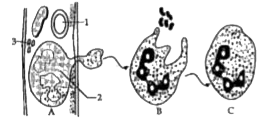
Name the cells labelled 1,2 and 3
View SolutionStudy the diagrams given below and answer the questions tht follow:
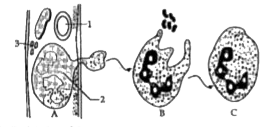
Identify the phenomenon occurring in A. Explain the phenomenon.
View SolutionStudy the diagrams given below and answer the questions tht follow:
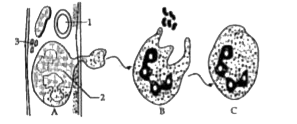
Mention two structural differences between 1 and 2
View SolutionStudy the diagrams given below and answer the questions that follow:
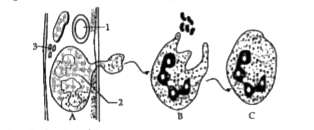
Name the process occurring in B and C.
View SolutionStudy the diagrams given below and answer the questions that follow:
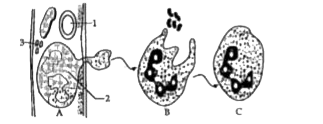
State the importance of this process in the human body.
View SolutionGive one difference between each of the following pairs on the basis of what is given in the brackets:
Mitral valve and Aortic semilunar valve(location)
View SolutionGive one difference between each of the following pairs on the basis of what is given in the brackets:
Hydrotropism and Thigmotropism (stimulus)
View SolutionGive one difference between each of the following pairs on the basis of what is given in the brackets:
Metaphase and Anaphase (position of chromatids)
View SolutionDifferentiate between the following pair on the basis of what is mentioned within bracket.
Demography and Population density [Definition]
View SolutionGive one difference between each of the following pairs on the basis of what is given in the brackets:
turgid cell and Plasmolysed cell (tonicity of the surrounding solution)
View SolutionAn outline sketch of a tree is shown in the diagram below. Study the same and answer the question that follow:
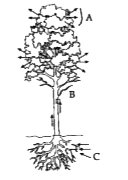
Name the phenomenon that is labelled A in the diagram.
View SolutionAn outline sketch of a tree is shown in the diagram below. Study the same and answer the question that follo:
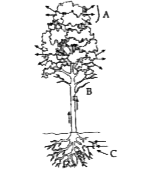
Explain the phenomenon occurring in A.
View SolutionAn outline sketch of a tree is shown in the diagram below. Study the same and answer the question that follo:
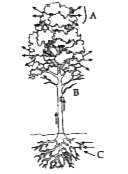
What is the importance of this phenomenon is plants.
View SolutionAn outline sketch of a tree is shown in the diagram below. Study the same and answer the question that follo:
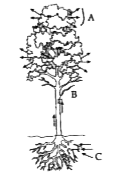
Explain the role of any three external factors that will increase the rate of this phenomenon.
View SolutionAn outline sketch of a tree is shown in the diagram below. Study the same and answer the question that follo:
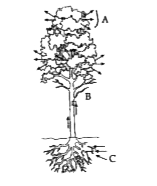
What does the direction of arrows in B and C indicate?
View SolutionMention the exact function of the following structures,
Iris
View SolutionState the major functions of
Plasma membrane
View SolutionMention the exact function of the following structures,
Nephron
View SolutionMention the exact location of the following structures : Thylakoids.
View SolutionDefine the following terms:
Hydathodes
View SolutionGiven below is a diagrammatic representation of a defect of the human eye which has been corrected using a suitable lens. Study the diagram and answer the questions that follow:
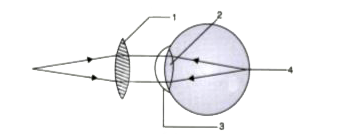
Identify the defect that has been corrected.
View SolutionGiven below is a diagrammatic representation of a defect of the human eye which has been corrected using a suitable lens. Study the diagram and answer the questions that follow:
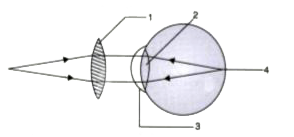
Mention two reasons for the above defect.
View SolutionGiven below is a diagrammatic representation of a defect of the human eye which has been corrected using a suitable lens. Study the diagram and answer the questions that follow:
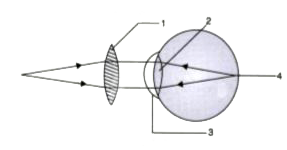
Label the parts numbered 1 to 4.
View SolutionGiven below is a diagrammatic representation of a defect of the human eye which has been corrected using a suitable lens. Study the diagram and answer the questions that follow:
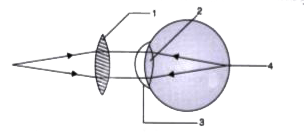
State the functions of the parts numbered 3 and 4.
View SolutionGiven below is a diagrammatic representation of a defect of the human eye which has been corrected using a suitable lens. Study the diagram and answer the questions that follow:
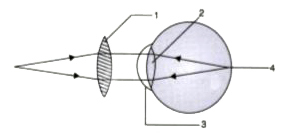
What maintains the shape of the eye ball?
View SolutionGive the biological/technical terms for the following:
The quick actions which are involumtary and controlled by the spinal cord.
View SolutionGive the biological/technical terms for the following:
The structure formed after the release of ovum from the Graafian follicle.
View SolutionGive technical term for the following:
Surgical method of sterilization in human female.
View SolutionGive the biological/technical terms for the following:
The stage of cell division in which the nuclear membrane disappears and the chromosomes become short and thick.
View SolutionGive technical term :
Onset of menstruation in a young girl around the age of 13 years.
View SolutionName the following :
The canal through which the testes descend into scrotum just before birth
View SolutionThe repeating components of each DNA strand lengthwise.
View SolutionGive the biological/technical terms for the following:
The site of photosynthesis in a plant cell.
View SolutionGive the biological/technical term for the following:
A constituent that causes pollution.
View SolutionIn china rose the flowers are:
View SolutionThe figure given below represents an experiment to demonstrate a particular aspect of photosynthesis. The alphabet "A" represents a certain condition inside the flask
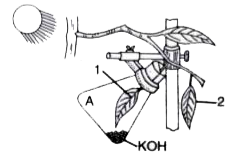
What is the aim of the experiment
View SolutionThe diagram below represents an experiment to demonstrate a particular aspect of a physiological process in plants. Study the diagram and answer the questions that follows:
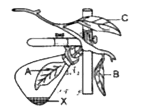
What is the chemical substance named X in the diagram? What is the special condition created inside the flask due to the presence of the substance X?
View SolutionThe diagram below represents an experiment to demonstrate a particular aspect of a physiological process in plants. Study the diagram and answer the questions that follows:
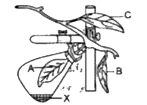
In what way will the three leaves A, B and C differ at the end of the experiment when tested with iodine solution?
View SolutionThe diagram below represents an experiment to demonstrate a particular aspect of a physiological process in plants. Study the diagram and answer the questions that follows:
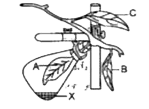
Write the overall chemical equation for the process mentioned.
View SolutionThe diagram below represents an experiment to demonstrate a particular aspect of a physiological process in plants. Study the diagram and answer the questions that follows:
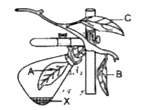
Explain the term Destarching.
View SolutionExplain the term plasmolysis. Give one application of this phenomenon in our daily lives.
View SolutionDefine the following:
Gestation period
View SolutionDefine the following term : Synapse.
View SolutionBriefly explain the following:
Photophosphorylation
View SolutionThe theory of use and disuse of organ was proposed by
View SolutionGiven alongside is a diagram of the male reproductive system in humans. Label the parts indicated by numbers 1 to 5, and state their functions. ........
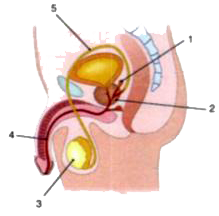
View SolutionGiven below is the diagram of the male reproductive system and its associated parts in the human body. Study the diagram and answer the questions that follow:
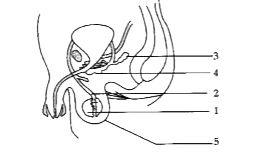
State the functionn of the part marked 2and 3.
View SolutionGiven below is the diagram of the male reproductive system and its associated parts in the human body. Study the diagram and answer the questions that follow:
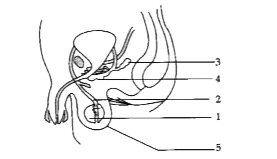
What is the significance of the part labelled 5.
View SolutionGiven below is the diagram of the male reproductive system and its associated parts in the human body. Study the diagram and answer the questions that follow:
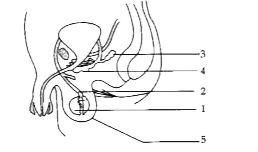
Mention the hormone secreted by the part labelled 1.
View SolutionGiven below is the diagram of the male reproductive system and its associated parts in the human body. Study the diagram and answer the questions that follow:
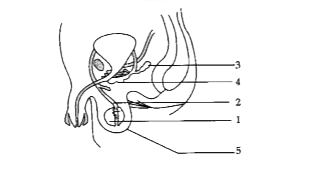
Draw a neat labelled diagram of a human sperm.
View SolutionComment upon the following:
The placenta is an important structure for the development of a foetus.
View SolutionGive biological reason for the following:
Throat infections could lead to ear infections.
View SolutionGive scientific reasons for the following statements:
We feel blinded for a short while entering a dark room when coming from bright light.
View SolutionComment upon the following:
The urine is slightly thicker in summer than in winter.
View SolutionGive scientific reasons for the following statements:
Loss of nucleus and mitochondria make erythrocytes more efficient in their function.
View SolutionA homozygous purple flower variety of pea [PP] is crossed with white flower variety of pea [pp]. Answer the questions that follow:
Mention the phenotype and genotype of the `F_(1)` generation of offsprings.
View SolutionA homozygous purple flower variety of pea [PP] is crossed with white flower variety of pea [pp]. Answer the questions that follow:
If the offsprings of the `F_(1)` generation are selfed, what will be the phenotypic and genotypic ratios of the `F_(2)` generation?
View SolutionA homozygous purple flower variety of pea [PP] is crossed with white flower variety of pea [pp]. Answer the questions that follow:
State Mendel's law of dominance.
View SolutionStudy the diagram given below and answer the questions that follow :
How is this structure well adapted for absorption of digested food ?
View SolutionA homozygous purple flower variety of pea [PP] is crossed with white flower variety of pea [pp]. Answer the questions that follow:
Name two genetic diseases in humans.
View SolutionAnswer the following questions briefly.
Mention two features of a Neanderthal man.
View SolutionWhat are the age restrictions for marriage for boys and girls in India
View SolutionMention any two objectives of 'Swachh Bharat Abhiyan'.
View SolutionGive two functions of the amniotic fluid.
View SolutionWhat are the suggested reasons for population explosion?
View Solution
SECTION -II questions and complete solutions for chapter SAMPLE QUESTION PAPER 2 of EVERGREEN BIOLOGY (ENGLISH) of Class 10